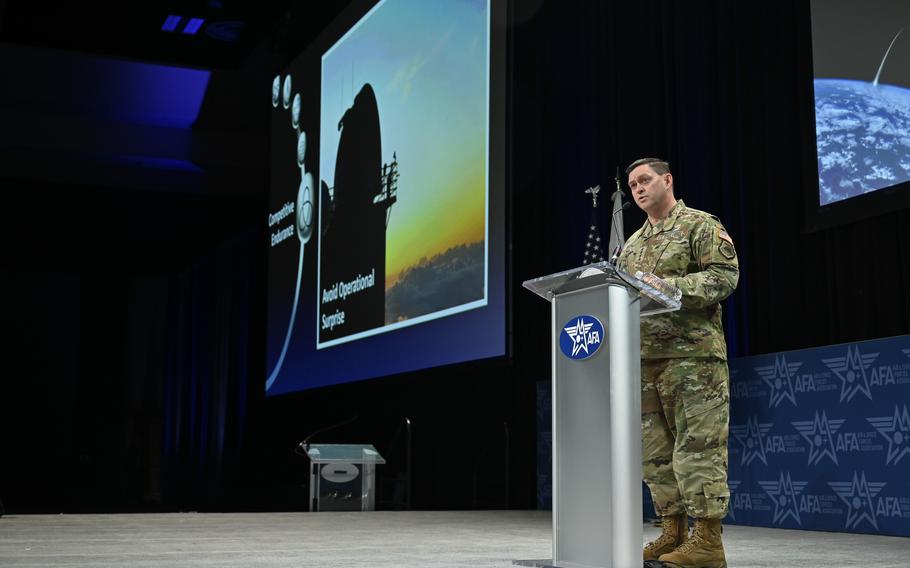
A Space Force guardian participates in a town hall meeting Jan. 23, 2023, at Ramstein Air Base in Germany. The service's newest component is set to stand up at Ramstein in December and will serve both U.S. European Command and Africa Command. (Alexandra M. Longfellow/U.S. Air Force)
KAISERSLAUTERN, Germany — Ramstein Air Base will be the headquarters of a new Space Force service component for Europe and Africa, according to the Air Force.
A ceremony to stand up U.S. Space Forces Europe-Africa is planned for Dec. 8 at Ramstein, Air Force spokeswoman Capt. Jackie Lockett said in a statement Wednesday.
Gen. Chance Saltzman, chief of space operations, announced the new unit Tuesday during a keynote address at the Air Force Association’s Air, Space and Cyber Conference in National Harbor, Md., Air and Space Forces magazine reported the same day.
The component will provide a subordinate space commander, space planning and employment expertise as well as space command and control specifically focused on the missions of U.S. European and Africa commands, Lockett said.
A cadre of Space Force members currently assigned to U.S. Air Forces Europe-Air Forces Africa will realign under the new organization, Lockett said, adding that there are no plans as of now to increase their numbers in 2024 beyond the initial 30 guardians or so.

Chief of Space Operations Gen. Chance Saltzman delivers a keynote speech at a symposium in Aurora, Colo., on March 7, 2023. Saltzman said guardians will be assigned to Stuttgart and Ramstein Air Base in Germany in support of U.S. European Command later this year. (Eric Dietrich/U.S. Air Force)
A need for interservice transfers isn’t immediately expected, either, she said. Not all personnel under the new component will work from Ramstein. The service will send some assignments to Stuttgart, Lockett said.
The Germany-based organization will be the fourth Space Force component for a regional combatant command since the service was established in December 2019 as the sixth branch of the armed forces.
It joins Space Forces Indo-Pacific, with headquarters in Hawaii in support of U.S. Indo-Pacific Command; Spaces Forces Korea at Osan Air Base, in support of U.S. Forces Korea; and Space Forces Central in Tampa, Fla., to support U.S. Central Command.
Defense Secretary Lloyd Austin authorized the activation of the Europe-based space component on June 29, Lockett said.
Locating the new Space Force component at Ramstein puts it close to NATO’s new space center, which operates from the bloc’s Allied Air Command on the base.
The space center was established about two years ago to coordinate space activities and share communications and satellite imagery with member countries.
At the 2021 Brussels summit, NATO acknowledged that attacks to, from or in space present a clear challenge to the security of the alliance and could lead to the invocation of Article 5, which would prompt collective defense measures by members.